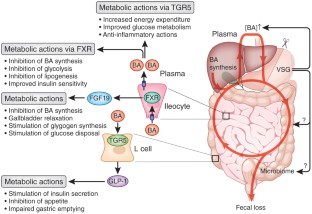FXR: the key to benefits in bariatric surgery? (original) (raw)
- News & Views
- Published: 07 April 2014
Nature Medicine volume 20, pages 337–338 (2014)Cite this article
- 5677 Accesses
- 29 Citations
- 2 Altmetric
- Metrics details
Subjects
Bariatric surgery reduces the weight of morbidly obese individuals and exerts beneficial effects on associated metabolic disorders such as type 2 diabetes. However, despite growing traction in this area of metabolic research, questions remain as to the mechanisms that lead to these benefits. New findings propose that the bile acid–activated nuclear receptor FXR mediates the metabolic improvement seen after one particular bariatric surgery approach and that this may involve alterations in the microbiome.
This is a preview of subscription content, access via your institution
Relevant articles
Open Access articles citing this article.
Access options
Subscribe to this journal
Receive 12 print issues and online access
$209.00 per year
only $17.42 per issue
Buy this article
- Purchase on SpringerLink
- Instant access to full article PDF
Prices may be subject to local taxes which are calculated during checkout
Additional access options:
Figure 1: The bile acid enterohepatic cycle and its potential links to the positive effects of bariatric surgery.

References
- Yanovski, S.Z. & Yanovski, J.A. J. Am. Med. Assoc. 311, 74–86 (2014).
Article CAS Google Scholar - Schauer, P.R. et al. N. Engl. J. Med. 366, 1567–1576 (2012).
Article CAS Google Scholar - Karamanakos, S.N. et al. Ann. Surg. 247, 401–407 (2008).
Article Google Scholar - Ryan, K.K. et al. Nature, doi:10.1038/nature13135 (26 March 2014).
- Lefebvre, P. et al. Physiol. Rev. 89, 147–191 (2009).
Article CAS Google Scholar - Ridlon, J.M. et al. J. Lipid Res. 47, 241–259 (2006).
Article CAS Google Scholar - Patti, M.E. et al. Obesity (Silver Spring) 17, 1671–1677 (2009).
Article CAS Google Scholar - Kohli, R. et al. J. Clin. Endocrinol. Metab. 98, E708–E712 (2013).
Article CAS Google Scholar - Sinal, C.J. et al. Cell 102, 731–744 (2000).
Article CAS Google Scholar - Kok, T. et al. J. Biol. Chem. 278, 41930–41937 (2003).
Article CAS Google Scholar - Cariou, B. et al. J. Biol. Chem. 281, 11039–11049 (2006).
Article CAS Google Scholar - Zhang, Y. et al. Mol. Endocrinol. 26, 272–280 (2012).
Article CAS Google Scholar - Prawitt, J. et al. Diabetes 60, 1861–1871 (2011).
Article CAS Google Scholar - Cariou, B. et al. FEBS Lett. 581, 5191–5198 (2007).
Article CAS Google Scholar - Dewulf, E.M. et al. Gut 62, 1112–1121 (2013).
Article CAS Google Scholar - Li, F. et al. Nat. Commun. 4, 2384 (2013).
Article Google Scholar
Author information
Authors and Affiliations
- Folkert Kuipers and Albert K. Groen are at the Departments of Pediatrics and Laboratory Medicine, University of Groningen, University Medical Center Groningen, Groningen, The Netherlands.,
Folkert Kuipers & Albert K. Groen
Authors
- Folkert Kuipers
You can also search for this author inPubMed Google Scholar - Albert K. Groen
You can also search for this author inPubMed Google Scholar
Corresponding author
Correspondence toFolkert Kuipers.
Ethics declarations
Competing interests
The authors declare no competing financial interests.
Rights and permissions
About this article
Cite this article
Kuipers, F., Groen, A. FXR: the key to benefits in bariatric surgery?.Nat Med 20, 337–338 (2014). https://doi.org/10.1038/nm.3525
- Published: 07 April 2014
- Issue Date: April 2014
- DOI: https://doi.org/10.1038/nm.3525